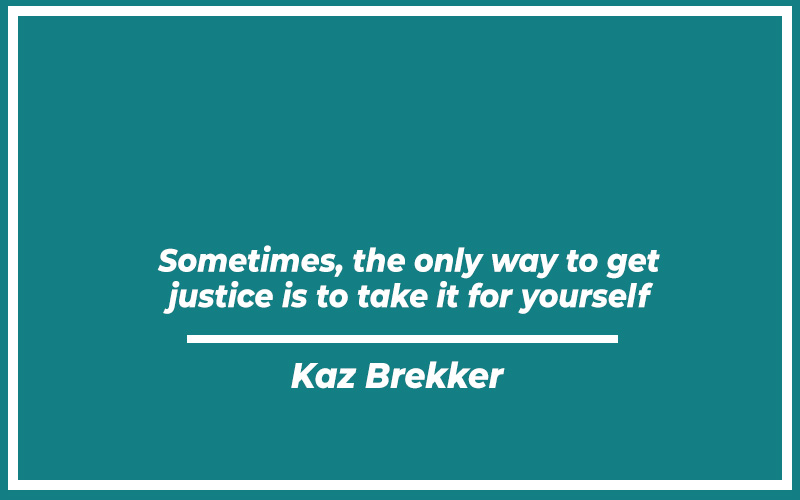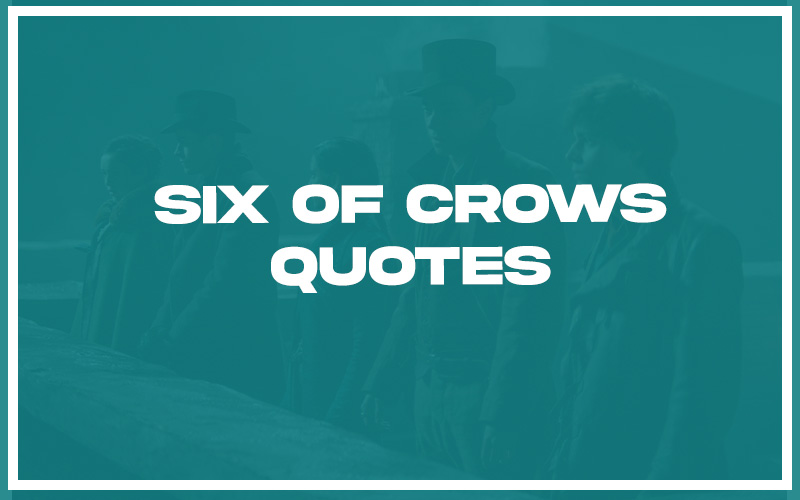The Grishaverse, created by Leigh Bardugo, is a world of magic, high stakes, and amazing characters.
One of her most popular books, “Six of Crows,” follows a ragtag crew of teenagers – criminals with exceptional talents – on a daring heist.
Here are some popular quotes from Six of Crows!
Six of Crows Quotes

“Greed may do your bidding, but death serves no man.” – Kaz Brekker
Kaz Brekker‘s quote highlights the limits of human control and ambition. While one might manipulate greed to their advantage, death remains an ultimate force that defies manipulation.
This reflects Kaz’s pragmatic outlook on life and the darker aspects of his character, who understands the inevitability and impartiality of death in contrast to more controllable elements like greed.
Also Read: Beth Dutton Quotes (with Explanations)
“And that’s what destroyed you in the end—the longing for something you could never have.” – Kaz Brekker
Kaz’s quote encapsulates the destructive nature of unfulfilled desires. Longing for the unattainable can consume a person, leading to their downfall.
This reflection is particularly poignant for Kaz, whose ambitions and desires are often thwarted by the harsh realities of his world. It underscores a central theme in “Six of Crows”: the dangers of yearning for what lies beyond one’s grasp, and the toll such longing can take on the human spirit.
“The water hears and understands. The ice does not forgive.” – Matthias Helvar
This Matthias Helvar quote draws a stark contrast between two elements of nature, symbolizing understanding and unforgiveness. Water, which hears and understands, represents empathy and fluidity, whereas ice, which does not forgive, embodies rigidity and coldness.
This metaphor reflects Matthias’s inner conflict and the harsh, unforgiving nature of the world he inhabits. It speaks to the idea that some things are flexible and can adapt, while others remain unyielding and harsh, much like the characters’ struggles and the environment around them.
“Many boys will bring you flowers. But someday you’ll meet a boy who will learn your favorite flower, your favorite song, your favorite sweet.” – Inej Ghafa
Inej’s quote emphasizes the difference between superficial gestures and deep understanding in relationships. While many may offer generic tokens of affection, a truly meaningful connection is characterized by someone who takes the time to learn and appreciate the small details that make you unique.
This reflects Inej’s desire for genuine intimacy and recognition, highlighting the importance of personal connection over conventional romantic gestures. It underscores the theme of seeking deeper, more authentic relationships amidst the chaos of their lives.
“Nina, you taught me to be something better. They could be taught, too.” – Matthias Helvar
Matthias’s quote acknowledges Nina’s positive influence on him and his belief in the potential for change in others. Despite his initial prejudices, Nina’s impact shows that people can evolve and overcome their biases.
This statement underscores the theme of redemption and personal growth, suggesting that even those with deeply ingrained beliefs can learn to be better. It speaks to the transformative power of love and understanding, highlighting the possibility of change and the hope for a better future.
“Suffering is like anything else. Live with it long enough, you learn to like the taste.” – Kaz Brekker
Kaz’s quote reflects his hardened nature and the grim reality of his life. Constant exposure to suffering can lead to a sort of numbing acceptance, where pain becomes a familiar companion rather than an adversary.
This statement underscores the theme of resilience and adaptation in the face of continuous hardship. It reveals Kaz’s coping mechanism for dealing with the relentless challenges he faces, illustrating how enduring suffering can shape and toughen a person over time.
“When everyone knows you’re a monster, you need not waste time doing every monstrous thing.” – Kaz Brekker
Kaz’s quote highlights the power of reputation and perception. Being known as a monster can serve as a deterrent, sparing one from having to constantly prove their ruthlessness. This reflects Kaz’s strategic mind, using his fearsome reputation to his advantage.
It underscores the theme of identity and how one’s image can be manipulated to influence others’ actions and decisions. This quote also delves into the complexities of Kaz’s character, revealing the layers behind his feared persona.
“She wouldn’t wish love on anyone. It was the guest you welcomed and then couldn’t be rid of.” – Inej Ghafa
Inej’s quote underscores her complex relationship with love, viewing it as a double-edged sword. Love brings joy but also pain and vulnerability. This mirrors her experiences and the emotional armor she has built to protect herself.
Her metaphor of love as an unwelcome guest encapsulates the bittersweet nature of affection and attachment in her tumultuous world.
“If any of you survive, make sure I have an open casket. The world deserves a few more moments with this face.” – Jesper Fahey
Jesper’s quote is a blend of his confidence and humor, even in the face of danger. This gallows humor exemplifies his ability to remain light-hearted and maintain a sense of self amidst the dire circumstances the crew often finds themselves in.
His remark about an open casket speaks to his vanity and the bravado he uses to mask his deeper insecurities.
“You still may die in the Dregs.” / “I may. But I’ll die on my feet with a knife in my hand.” – Inej Ghafa
This exchange illustrates Inej’s fierce determination and acceptance of the dangers she faces. Her readiness to meet death on her terms, armed and fighting, symbolizes her resilience and the agency she exercises over her fate.
It also reflects the perilous life led by members of the Dregs and their resolve to face threats head-on.
“The easiest way to steal a man’s wallet is to tell him you’re going to steal his watch.” – Kaz Brekker
Kaz’s quote reveals his deep understanding of human psychology and his cunning nature. By diverting attention with a misleading threat, the real objective becomes easier to achieve.
This strategy showcases his expertise in manipulation and deception, core traits that define his leadership and survival skills in the criminal underworld.
“Better terrible truths than kind lies.” – Kaz Brekker
Kaz values honesty, even when it’s harsh, over comforting falsehoods. This philosophy is central to his character, reflecting his belief that facing reality head-on is crucial for survival and trust.
It also underscores the gritty and unforgiving world in which he operates, where illusions can be more dangerous than the stark truth.
“No mourners. No funerals. Among them, it passed for ‘good luck.'” – Kaz Brekker
This phrase, often repeated among the Dregs, serves as a grimly optimistic farewell. It reflects their constant brush with death and the camaraderie that forms in such a life.
The expression signifies their acceptance of mortality and the dark humor they use to cope with the omnipresent danger in their lives.
“There was no part of him that was not broken, that had not healed wrong, and there was no part of him that was not stronger for having been broken.” – Kaz Brekker
Kaz’s quote reflects his resilience and the paradoxical strength that comes from surviving trauma. Each broken part of him, though healed improperly, has contributed to his formidable character.
This commentary highlights the theme of inner strength born from adversity, portraying Kaz as a character who has transformed his pain into power. It speaks to the broader message in “Six of Crows” about the potential for growth and strength in the aftermath of suffering and loss.
“The life you live, the hate you feel—it’s poison. I can drink it no longer.” – Matthias Helvar
Matthias’s quote is a poignant acknowledgment of the destructive nature of hatred. By referring to hate as poison, he emphasizes its corrosive impact on the soul. His decision to let go of this hatred marks a significant moment of personal growth and redemption.
This commentary underscores the theme of forgiveness and the heavy toll of carrying hatred. It reflects Matthias’s journey towards inner peace and the transformative power of letting go of past grievances for a better future.
“Fear is a phoenix. You can watch it burn a thousand times and still it will return.” – Inej Ghafa
Inej’s quote beautifully captures the cyclical nature of fear. Comparing fear to a phoenix, she highlights its ability to regenerate and persist, no matter how many times it is faced and conquered. This metaphor speaks to the constant presence of fear in her life and the lives of those around her.
The commentary emphasizes the theme of bravery in “Six of Crows,” showcasing that true courage is not the absence of fear, but the resilience to confront it repeatedly.
“We learn to wring magic from the ordinary. That was how you survived when you weren’t chosen, when there was no royal blood in your veins.” – Kaz Brekker
Kaz’s quote emphasizes the theme of self-reliance and ingenuity. In a world where lineage and birthright often dictate one’s fate, finding extraordinary potential within the mundane becomes a means of survival. This commentary highlights the idea that greatness can be achieved through resourcefulness and determination, regardless of one’s background.
It reflects Kaz’s belief in creating one’s destiny through sheer willpower and cunning, a central theme in “Six of Crows.”

“Sometimes, the only way to get justice is to take it for yourself.” – Kaz Brekker
Kaz’s quote underscores the harsh reality that justice is not always served fairly by existing systems. It highlights the need for taking matters into one’s own hands when traditional avenues fail.
This commentary emphasizes the theme of vigilantism and moral ambiguity in “Six of Crows,” where characters often operate outside the law to achieve their goals. It reflects Kaz’s pragmatic approach to justice, suggesting that in an unjust world, one must create their own path to fairness.
“I would have come for you. And if I couldn’t walk, I’d crawl to you, and no matter how broken we were, we’d fight our way out together-knives drawn, pistols blazing.” – Kaz Brekker
Kaz’s quote reveals his deep loyalty and commitment to those he cares about. His vow to fight alongside his allies, regardless of their brokenness, underscores the theme of solidarity and perseverance.
This commentary highlights the intense bonds formed between the characters in “Six of Crows,” showcasing their willingness to endure and overcome any obstacle together. It reflects the strength of their relationships and the unwavering support they offer each other in their darkest moments.
“Crows remember human faces. They remember the people who feed them, who are kind to them. And the people who wrong them too. They don’t forget.” – Kaz Brekker
Kaz’s quote draws a parallel between the behavior of crows and the nature of his crew. Just as crows remember those who have shown kindness or caused harm, so too do the characters in “Six of Crows” hold on to their experiences and memories.
This commentary emphasizes the theme of loyalty and retribution, reflecting the importance of trust and the consequences of betrayal.
“You don’t ask for forgiveness, Kaz. You earn it.” – Inej Ghafa
Inej’s quote underscores the notion that true redemption comes from actions, not words. In a world fraught with betrayal and moral ambiguity, merely asking for forgiveness is insufficient.
This commentary emphasizes the theme of atonement and personal growth in “Six of Crows.” Inej’s belief reflects the deeper struggle of the characters to reconcile their past actions with their present selves, highlighting the importance of deeds over intentions in earning trust and forgiveness from others.
“There is no shame in meeting a worthy opponent. It means there is more to learn, a welcome reminder to pursue humility.” – Matthias Helvar
Matthias’s quote highlights the value of humility and the lessons that can be learned from facing worthy adversaries. Recognizing the strength in others provides an opportunity for self-improvement and growth.
This commentary underscores the theme of honor and respect in “Six of Crows,” showing that true strength lies in acknowledging and learning from one’s opponents. It reflects Matthias’s evolving worldview and his journey towards becoming a more enlightened and humble individual.
“Men mock the gods until they need them, Kaz.” – Inej Ghafa
This Inej Ghafa quote speaks to the human tendency to disregard higher powers or moral principles until faced with dire circumstances.
This commentary emphasizes the theme of faith and desperation in “Six of Crows,” illustrating how characters often resort to seeking divine or moral intervention when in peril. It reflects the complexities of belief and skepticism in the face of adversity, highlighting the characters’ struggle to reconcile their actions with their need for higher guidance and support.
*”The trick is not getting knocked down.”
“No, Kaz, the trick is in getting back up.”* – Kaz Brekker and Inej Ghafa
This exchange between Kaz and Inej encapsulates the essence of resilience and perseverance. While avoiding failure is important, the true test of character lies in the ability to rise after being knocked down.
This commentary highlights the central theme of survival in “Six of Crows,” showcasing the characters’ unwavering determination to overcome obstacles. It reflects their indomitable spirit and the strength they derive from each other, emphasizing the importance of persistence in their tumultuous lives.
“It’s just so much easier to kill people than take care of them.” – Kaz Brekker
Kaz’s quote starkly contrasts the simplicity of destruction with the complexity of nurturing. This commentary emphasizes the theme of moral ambiguity in “Six of Crows,” where the characters often grapple with the easier path of violence over the harder path of compassion and care.
It reflects Kaz’s pragmatic and often cynical worldview, highlighting the challenges of choosing empathy and responsibility in a world that constantly pushes them towards brutality and self-preservation.
“What doesn’t kill me better run.” – Jesper Fahey
Jesper’s quote is a defiant declaration of his resilience and readiness to retaliate. This commentary underscores the theme of survival and defiance in “Six of Crows,” showcasing Jesper’s unyielding spirit and his determination to face challenges head-on.
It reflects his bold personality and the fierce loyalty he has towards his friends, highlighting his ability to turn adversity into strength and his refusal to be defeated by the hardships he encounters.
“You were angry. Angry wears off. I needed you righteous.” – Kaz Brekker
Kaz’s quote emphasizes the distinction between fleeting anger and enduring righteousness. This commentary highlights the theme of justice and moral conviction in “Six of Crows,” where the characters often wrestle with their emotions and motivations.
It reflects Kaz’s strategic thinking and his understanding that true change and impact come from a place of principled action rather than temporary rage. This insight underscores the deeper moral struggles the characters face in their quest for justice and revenge.
Also Read: Deadbeat Dad Quotes (with Explanations)
Final Thoughts
Ketterdam’s streets are crawling with dangerous characters, but none quite as captivating as the crew in “Six of Crows.”
If you’re looking for a reminder that found families can be just as strong as blood, we hope you have your answer today because these “Six of Crows” quotes are just what you need.

